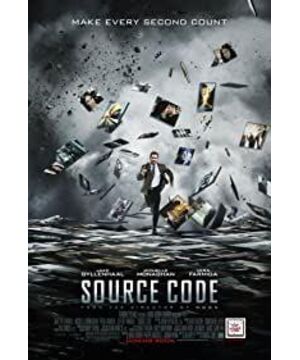What I didn’t expect after watching it was that the plot setting of this film was almost completely a replica of the game "Ghost Trick" that I played not long ago, except for the cultural differences that made the game use magical techniques and the movie used it. Apart from sci-fi techniques, the similarity between these two games in settings is almost over 99%! This also makes me wonder if there is really any connection between the two...
For what this game is about, let me briefly explain: after death, the soul of a person leaves his body and attaches to other objects. "It" can manipulate and control this object to accomplish some things, and even return to "it" within a few minutes before the death of itself or others, and manipulate things to change the fate of death... I can only say this about this. So far, if you want to fully elaborate on this extremely complex rule system set by the game, I am afraid it will be very long and not easy for people who have never played the game to understand.
In fact, compared with the intricate clues set by Ghost Trick and the dazzling storyline that goes around, the plot of this film is really simplified too much. It can be said that if you can persist in playing the game and understand the plot before, it is completely trivial to understand the plot of the film.
There was only one "soul" performing the mission this time-Captain Stevens, only one object was manipulated-Sean, and even only one incident to be resolved-the train explosion case. All the protagonist can do is go back to 8 minutes before the incident and start taking action.
The protagonist’s actions before his last return were actually investigating the cause of the case. At this time, the last thing the protagonist has to worry about is the question of time, because after all, he can return to that point in time for an unlimited number of times to re-investigate, even if he has gone through some detours before, as long as the final investigation finds the result, his task will be considered complete.
The last time the protagonist returns to that point in time is the real change of history. It is said that this section of the game that should be the highlight is relatively unimportant in this film. For me, the outcome of this operation can be thought of without guessing. But at the end of the film, it gave a relatively unexpected ending: I thought that the protagonist's action was only fulfilling his own wish, but at the end of the film, he told the audience-he did indeed change history in the end! Perhaps for some people, this ending is a bit unexpected, but in my opinion, this ending setting really makes the film a Ghost Trick, and even this ending has become a Ghost Trick-like ending.
Although I used Ghost Trick's method to explain this film, it was easy to explain it. Unfortunately, if you really use the theory of Ghost Trick to explain the film, although it is easy to explain in the plot, because the film does not establish a complex and strict rule system like Ghost Trick, In this way, if we continue to use this method to analyze the film in depth, it will cause more unexplainable problems. I also decided to use Ghost Trick's method to analyze the plot after seeing the ending of the film. I really don't want to rely on Ghost Trick for other endings.
View more about Source Code reviews











